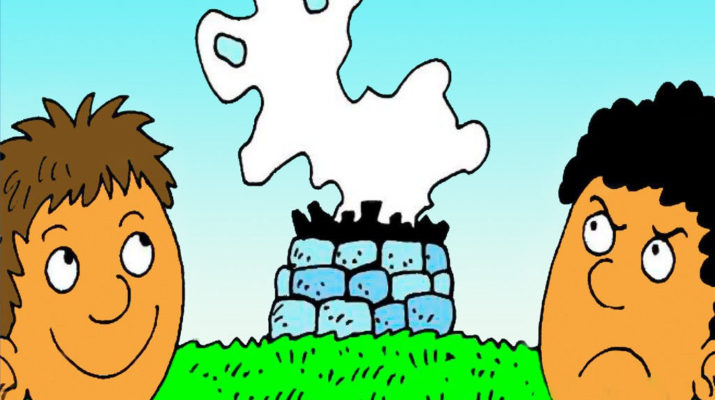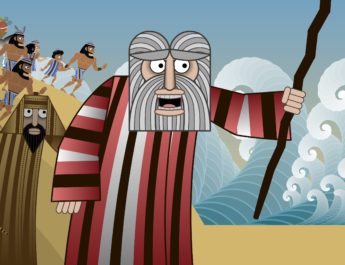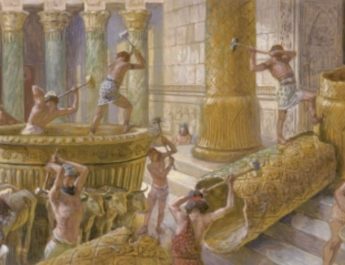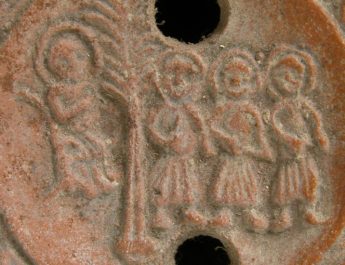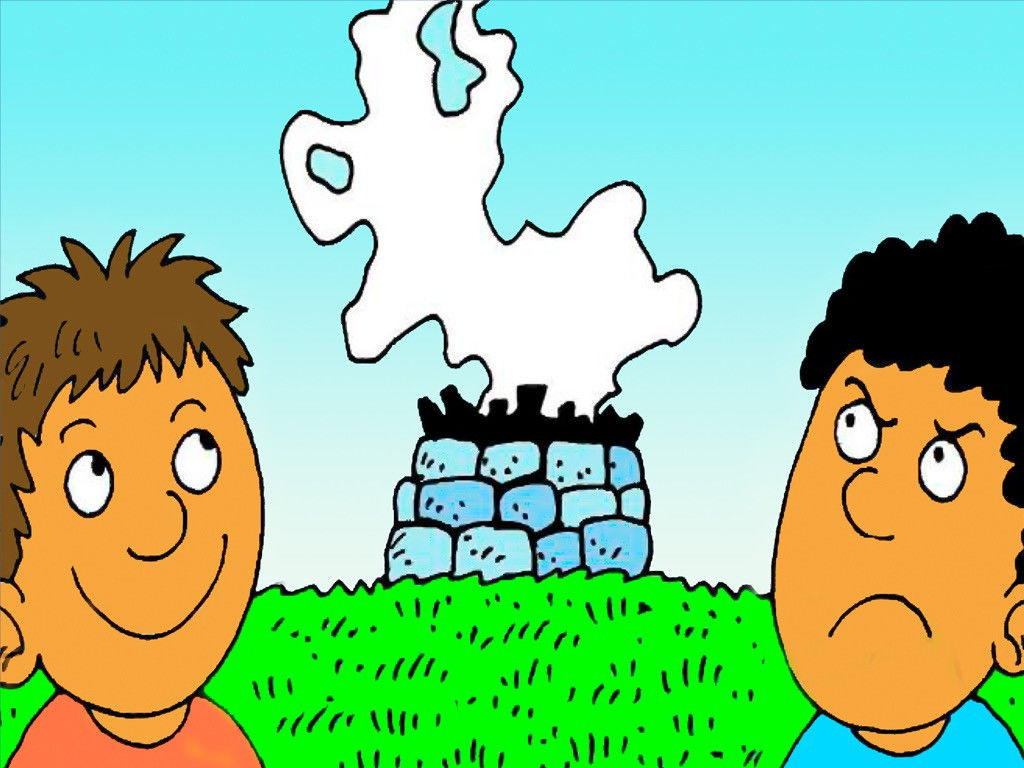
Cain Murders Abel
Gen 4:1-16
1Now the manA knewB his wife Eve,C and she conceived and bore Cain,D saying, “I have producedE a manF with the help ofG the Lord.”H 2Next,I she bore his brother Abel.J Now Abel was a keeperK of sheep,L and Cain a tillerM of the ground.N
A “man” = adam. May be from a word meaning “to be red” (like Edom) or from adamah (dirt, ground). This word is used for man (as the first man) as well as for humankind.
B “knew” = yada. This word literally means “to know,” but euphemistically means sexual intercourse.
C “Eve” = chavvah. Eve is only named twice – when Adam gives her the name and here where she gives birth. Derived from the word meaning “to live,” her name means life-giver.
D Cain” = qayin. Several possibilities for name meaning. Could be from a word that means “spear,” itself derived from a word that means chanting a dirge, lamenting; which, in turn comes from a primitive root that means “to strike a musical note.” Alternately, it could be wordplay from qanah, which means to acquire, erect, create. This word means to attain something especially by purchasing it. It implies ownership.
E “produced” = qanah. As mentioned in Note D, this word means to acquire. It is also similar to an Arabic root meaning “smith,” that carries a secondary sense of fashioning or producing. (Sarna 1989).
F “man” = ish. Different word from that used earlier in this verse. This word is a contraction from enosh, which refers to humankind or mortal. It is, in turn, derived from a word that means being sick or frail (hence, mortal).
G “with the help of” = et. The verse more literally says, “I have produced a man with the Lord.”
H “Lord” = YHVH. The Tetragrammaton – God’s name given at the burning bush. From a verb that means to become, to be. It is the self-existent and eternal one. Though the Tetragrammaton has been used throughout Gen 2-3 to refer to God, Eve is the first human to say the divine name (Sarna 1989).
I “Next” = yasaph. More literally, “again.”
J “Abel” = hebel. Shares a root with the word for vapor, breath, emptiness, vanity. Abel’s name practically means he’s non-existent or easily blown away. Since names in scripture give us hints about a person’s essence, this name does not bode well for Abel.
K “keeper” = ra’ah. This word means to tend a flock, to pasture it. It can also mean keeping company with others – having or being a friend. Whereas Cain followed in his father’s profession and became a farmer, Abel does something new – something that involves relationship with a large group and attention to their different needs and wanderings. There is a tradition that humankind was vegetarian until after the flood (Gen 9:3-5), which would mean the livestock were for milk, wool, and perhaps their hides (Sarna 1989).
L “sheep” = tson. Comes from an unused root that has the sense of “to migrate.” Can also refer to cattle, goats, or any kind of flock.
M “tiller” = abad. This word can mean work or service in a general sense as well as being a servant or enslaved. Cain worked the same ground that would cry out against him. Perhaps he should know better what the ground would want (water not blood) since it is his life’s work to cultivate it.
N “ground” = adamah. A possible root of Adam’s name (see Note A). Cain’s profession connects him to his father – perhaps Abel’s relational job connects him to his mother, the mother of all living. This raises excellent questions about who does triumph and who should triumph in conflicts of connection versus disconnection, cooperation versus competition, self-focus versus community focus. God calls Cain’s drive toward competition, violence, and dominance a sin that we can “master.” Do we believe it? Can we live into it?
3 In the course of time,O Cain brought to the Lord an offeringP of the fruitQ of the ground,R 4 and Abel for his partS brought of the firstlingsT of his flock, their fat portions.U And the Lord had regardV for Abel and his offering, 5 but for Cain and his offering he had no regard. So Cain was very angry,W and his countenance fell.X
O “in the course of time” = literally “It was in the course of days.” The word “course” = qets. It is a short form of a verb that means to cut off literally or figuratively. This word is for an end, a border, process, or extremity. The word for “days” = yom and it is used literally and figuratively. Its root means being hot, so day refers to the hours that are warm.
P “offering” = minchah. This word generally refers to an offering of sacrifice that is bloodless and voluntary. This is the first recorded offering/act of worship in the Bible. Was it the first ever worship or did Adam and Eve worship and teach their sons? Did Cain come up with the idea of sacrifice and he grows mad that his little brother is copying him?
Q “fruit” = peri. Root word means to bear fruit, be fruitful, increase. This is being fruitful in a literal or figurative sense. It is also the root word of Ephraim. This word means fruit or reward.
R “fruit of the ground” = This word from ground is also Adamah (see Notes A and N). Sometimes people read this story and decide that Cain’s offering must have been unworthy (rotten fruit that fell from the trees or low quality ground fruits), but no value judgment is given about the quality of Cain’s offering at this point.
S “for his part” = gam. This word can be also, moreover, alike, or likewise. Abel was influenced by his brother for good and chose the good…or was he as insubstantial as his name suggests and just followed along because this is what people were doing?
T “firstlings” = bekorah. 14x in OT. The root of this word is to bear new fruit – properly, it’s the one who opens the womb. Used of a firstborn animal as well as a firstborn son or his birthright. Might Cain as the firstborn taken some offense to his brother’s sacrifice of a firstborn – even though it was an animal?
U “fat portions” = cheleb. This is the marrow or the grease – the richest and best part. Biblically, this word is used literally and figuratively.
V “regard” = shaah. 15x in OT. Used of God, for example, when Job asks God to look away (Job 7:19 & Job 14:6). Also used of David’s enemies (2 Sam 22:42), regarding God’s statutes (Ps 119:117), and looking to God as in trusting God (Isa 31:1). This word means to gaze at with the sense of looking to someone for help. It implies consideration and being compassionate or looking around in amazement. It can also mean to regard favorably or to respect.
W angry” = charah. Related to a word that means hot, scorched, burn. Something that glows – literally to melt, burn, or dry up. Used figuratively of showing or inciting passion. This word means to be thoroughly enraged, warm, blazing up in anger, zeal, or jealousy.
X “countenance fell” = We remember the Aaronic blessing “the Lord bless you and keep you; the Lord’s face shine upon you and be gracious to you. May the Lord’s countenance be lifted to you and give you peace” (Num 6:24-26). A lifted countenance or a countenance shining are signs of acceptance, favor, even grace and blessing. If you lift your face to the Lord and you see that the Lord looks away, your own face would fall, indeed.
6 The Lord said to Cain, “WhyY are you angry, and why has your countenance fallen? 7 If you do well,Z will you not be accepted?AA BBAnd if you do not do well, sinCC is lurkingDD at the door; its desireEE is for you, but you must masterFF it.
Y “why” = mah. This is basically all the interrogative words rolled up in one. God asks Cain – why do you choose anger? Why are you looking away, giving up, deepening your inner wounds? There are many ways to react in this moment and your choosing a dangerous path. It is in your power not to blame your brother, feed your anger, and lash out at him. Why is that what you want? Why don’t you see that that is wrong?
Z “do well” = yatab. This is being good, being pleasing or accepted. Being a benefit. Literally, something sound or something beautiful. This is the root of the word that is generally translated “good” in the OT.
AA “accepted” = seeth. 14x in OT. The root word here means to lift, carry, take. It is also used symbolically for forgiveness (God lifting up/taking away sins). This word can mean exaltation or dignity in general. It is also used of a leprous swelling (as a thing lifted up from the body). This word can figuratively mean elation or being cheerful. Here, it likely has more to do with a exaltation of rank of character (a rise in status or favor)
BB Literally “not if do well be accepted” contrasted to the next statement “and if not do well, at the door sin lurks”
CC “sin” = chatta’ah. Root of this word means to miss, go wrong, bear blame. Sin is when we miss the mark. This word can refer to sin and the punishment of it.
DD “lurking” = rabats. This word recalls an animal crouched on all fours or sprawled out – brooding or crouching
EE “desire” = teshuqah. 3x in OT. In Gen 3:16, Eve was told that her desire would be for her husband and he would rule over her. Here, Cain is told that sin’s desire is for him, but he must master it. The words for desire are the same as are “rule” and “master.” The other usage is from the Song of Solomon when the woman states that her beloved’s desire is for her (Cant 7:10). The root of this word is related to a word that means to be abundant, to overflow. It has a sense of stretching out after something or someone. Here, the word is longing or desire.
FF “master” = mashal. This word means to rule, have dominion, and reign. See Note EE.
8Cain said to his brother Abel, “Let us go out to the field.”GG HH And when they were in the field,II Cain rose up against his brother Abel, and killedJJ him. 9Then the Lord said to Cain, “WhereKK is your brotherLL Abel?” He said, “I do not know; am I my brother’s keeper?”MM
GG “Let us go out into the field” = this phrase is not in all manuscripts.
HH It seems that open fields were a regular setting of crime (like we might say “take someone down a dark alleyway) – see Dt 22:25, 2 Sam 14:6 (Sarna 1989).
II “field” = sadeh. From the same root as saday – field, land, almighty. From a verb that means to deal violently with, be burly – fig. for powerful. This word is field, land, country, ground, soil, wild.
JJ “killed” = harag. To kill, slay, destroy, murder. To smite with deadly intent, destroy.
KK Did Cain run from the scene or bury the body quickly? Is this God giving Cain the opportunity to repent? (Sarna 1989)
LL The word “brother” occurs 7x in this passage, emphasizing perhaps what this relationship should be in contrast to what it is.
MM “keeper” = shamar. This word means to keep, guard, or preserve. Properly, it is to put a hedge around something with thorns. More generally, it means to protect or attend to something. This word is used when God tells Abraham to “keep my covenant” (Gen 17:9) and when God tells Moses, “you shall keep my sabbaths” (Ex 31:13), and when the people are told to, “keep the Passover of the Lord your God” (Dt 16:1)
10And the Lord said, “What have you done?NN Listen; your brother’sOO bloodPP is crying outQQ to meRR from the ground! 11And now you are cursed from the ground,SS which has openedTT its mouth to receiveUU your brother’s blood from your hand.VV 12When you tillWW the ground, it will no longer yield to you its strength;XX you will be a fugitiveYY and a wandererZZ on the earth.AAA
NN “done” = asah. To do, make, or accomplish – used widely. The sense of “accomplishment” is interesting to me here – like God is asking, “what do you think you really accomplished here?”
OO “your brother’s” = Cain disavows responsibility for Abel, but God repeatedly reasserts that this is your brother – to the extent that God stops calling him by his name. Whoever Abel was, the fact that he is Cain’s brother should transcend temporary hurts.
PP “blood” = dam. Related to a word that means to cease – to grow or be silent, to cut off, hold peace, rest. This word is used for blood of humans and animals, sometimes used figuratively for wine or for bloodguilt or bloodthirstiness. Here, the idea of Cain’s bloodguilt crying out from the ground adds a powerful nuance.
QQ “crying out” = tsaaq. This word means to cry, call, or shriek. It can also be to proclaim an assembly. With this nuance, we can imagine either a sense of crying out in pain or a sense of the blood calling the attention of the rest of humanity to the sin/crime committed here.
RR Literally “the voice of the blood of your brother cries out to me.” The word for “voice” = qql and can mean any sound.
SS “cursed from the ground” = because Cain has desecrated the ground with his brother’s blood, the ground itself stands against him in a curse. He will never be the same, his livelihood will never be the same, but he will have to live with the aftermath of what he has done.
TT “opened” = patsah. 15x in OT. Used especially of mouths – Jephthah making a vow (Jdg 11:35-36), enemies taunting (Ps 22:13), and Ezekiel eating the scroll (Ezek 2:8). It is also used of the ground swallowing up the rebels in Korah’s rebellion (Num 16:30; Dt 11:6)
UU “receive” = laqach. More commonly rendered take, but can also mean accept or carry away.
VV “hand” = yad. This word literally means hand, but it also denotes what one is able to do and power.
WW “till” = abad. Same word as “tiller” in Gen 4:2.
XX “strength” = koach. This word comes from an unused root meaning to be firm. This word is ability, strength, power, vigor. It is force in a good or bad sense. Used figuratively for capacity, means, produce. It also refers to a hardy lizard or chameleon of some kind.
YY “fugitive” = nuah. This word means to waver literally or figuratively. It means to quiver, tremble, go up and down, be a fugitive.
ZZ “wanderer” = nud. This means to move to and fro, flutter, show grief, flee, mourn. It is to nod, thus, to waver – to wander or disappear. Can mean to nod (in sympathy) – console. It can also be used of deploring someone by tossing one’s head in scorn, taunting them. Taken together, Cain is told he will be a, “na va-nad.”
AAA “earth” = erets. This is a different word from the word for “ground” that has been used in this chapter to this point. It can also mean field, ground, or land. It is often used in the sense of the land (of Israel, Egypt, etc.)
13Cain said to the Lord, “My punishmentBBB is greaterCCC than I can bear!DDD EEE14Today you have drivenFFF me away from the soil,GGG and I shall be hiddenHHH from your face; I shall be a fugitive and a wanderer on the earth, and anyoneIII who meetsJJJ me may killKKK me.”
BBB “punishment” = avon. This is a different word than the word used for “sin” in Gen 4:7. This word may also be related to the sense of twisting, but as something being amiss or crooked. Here, it means iniquity, guilt, sin as well as the punishment for that iniquity. Does Cain proclaim that his sin is to great, his guilt over that sin, or the punishment he is receiving? Has he recognized the depth of the offense against God, the weight of his own guilty conscience, or is he merely complaining about being punished? Is it all of these things or only some of them?
CCC “greater” = gadol. Root means to grow up, become great or wealthy from the sense of something twisting so that it becomes large. This word is great, deep, big, more – a noble or powerful or distinguished person. It can also mean main or major or heavy.
DDD “bear” = nasa. This means to lift, carry, take, or suffer.
EEE [untranslated] = hen. There is an untranslated interjection here: lo! Behold! It can also mean if or though, turning this into a conditional sentence. If that’s the case, perhaps this sentence is more of an effort to bargain – “if you have driven me today…”
FFF “driven” = garash. This word also means to cast out or expel. It can be used to banish someone or to divorce someone.
GGG “from the soil” = Literally “from the face of the soil.” “Soil” here is adamah (“ground”) again. Perhaps he fears that even the ground won’t “look” at him.
HHH “hidden” = sathar. This word means to hide, conceal, or be absent. It is to hide by covering oneself or something.
III “anyone” = kol. More literally, this means “everyone.”
JJJ “meets” = matsa. This word means to find, catch, or come forth. Figuratively it can mean to occur, or to meet. If we take the more literal sense, Cain is suggesting that everyone is actively looking for him to kill him.
KKK “kill” = harag. Same word used when Cain killed Abel in Gen 4:8. The “may” is not found in Hebrew. More literally, it reads “anyone who finds me will kill me.”
15The the Lord said to him, “Not so!LLL Whoever kills Cain will suffer a sevenfold vengeance.”MMM And the Lord put a markNNN on Cain, so thatOOO no one who came upon him would killPPP him. 16Then Cain went away from the presenceQQQ of the Lord, and settled in the land of Nod,RRR east of Eden.SSS
LLL “not so” = laken. This word is more like so, thus, or after that. It doesn’t have a sense of negation. It does have the sense of what is just or rightly so.
MMM “sevenfold vengeance” = Is God promising to supply the vengeance or is God teaching us that violence begets violence? Is the sevenfold vengeance limited to the individual or is it spread sevenfold to their family and/or friends?
NNN “mark” = oth. Root means to sign, mark, describe with a mark. This can be a sign or a miracle. It’s a signal literally or figuratively so it includes, flags, monuments and omens as well as miracles.
OOO “so that” = bilti. This word comes from a word that means to wear out, become old, waster, spend, consume, fail. It implies decay or being used up. This word is more like lest, neither, not.
PPP “kill” = nakah. This is a different word than the one used when Cain killed Abel in Gen 4:8 and in Cain’s cry of concern to God in Gen 4:14. This word has the sense of smiting, beating, making wounds, slaughter, and punish. This word doesn’t stop at an attack that leads in death – it includes any attack light or severe.
QQQ “presence” = paneh. Literally “face.”
RRR “Nod” = Nod. From “nud” – the word for “wanderer” in Gen 4:12. So, Cain was to be a wandering in the land of wandering. The word for “settled” (yashab) can also mean “sit” or “remain.” So, this functions as a metaphorical description of his change of state as well as a functional one of being separated from Eden.
SSS “Eden” = eden. Related to a word that means luxury, delight, pleasure.
Work Cited
- Sarna, Nahum M. 1989. “Eden and the Expulsion: The Human Condition.” In Genesis, 1:32–33. The JPS Torah Commentary. Philadelphia, PA: The Jewish Publication Society.

